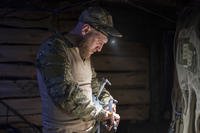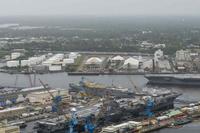SAN DIEGO – Coast Guardsmen offloaded more than 28,000 pounds of cocaine at Naval Base San Diego and were recognized by a senior Coast Guard official for their role in counter drug missions during a 90-day deployment Monday at 10 a.m.
The crew of Cutter Boutwell turned the cocaine, worth more than $423 million wholesale, over to agents from the Drug Enforcement Agency. The drugs were seized and 55 suspects were apprehended during 18 separate interdictions by U.S. Coast Guard and Navy forces off the coast of Central and South America as part of Operation Martillo. Six of the interdictions were made by the crew of the Cutter Boutwell who received the Coast Guard Meritorious Unit Commendation for their role in the operation.
“The success of the crew of Cutter Boutwell, and of all our U.S. forces deployed throughout the Eastern Pacific Ocean, showcase the resolve of the Coast Guard, our interagency partners, and the international community to combat transnational organized crime networks operating in the Western Hemisphere,” said Vice Adm. Charles W. Ray, the commander of Coast Guard Pacific Area in Alameda, Calif., who welcomed the crew home and presented them with their award. “These Coast Guard men and women successfully confronted the risks brought on by the rising threat of transnational organized crime networks, which must be confronted to ensure maritime safety, efficiency, and security in the Western Hemisphere.”
Boutwell’s crew coordinated with U.S. Coast Guard, U.S. Navy, Department of Defense, Department of Homeland Security, and partner-nation assets to execute 15 go-fast pursuits resulting in the interdiction of six drug laden vessels and disruption of nine additional cases. The crew of Boutwell seized more than 5,000 pounds of cocaine worth more than $75 million and detained 19 suspected smugglers.
“Our crew used their unique capabilities and authorities as a military service, law enforcement agency, and member of the U.S. intelligence community to disrupt transnational organized crime networks in the Eastern Pacific and keep drugs from making it to the U.S.,” said Capt. Edward A. Westfall, the commanding officer of Coast Guard Cutter Boutwell. “These illegal drug networks are dangerous breeding grounds for all types of trafficking and their immense profits fuel violence and instability.”
Operation Martillo, or Hammer, is one component in the U.S. Government's whole-of-government approach to countering the spread of transnational organized crime in Central America and the use of Central American littorals as transshipment routes for illicit drugs, weapons, cash, and human trafficking.
The Coast Guard Cutter Boutwell is a 378-foot high endurance cutter with a crew of about 160 people. The more than 45-year-old Boutwell and the other Secretary-class, high endurance cutters, are being replaced by the Legend-class, national security cutters (NSCs). The NCSs are better equipped, more durable, safer, and more efficient than their predecessor, and will continue to allow the Coast Guard to deliver its unique blend of military capability, law enforcement authority, and lifesaving expertise.
The narcotics aboard Boutwell were intercepted by a variety U.S. forces operating in the Eastern Pacific including Coast Guard Cutter Bertholf from Coast Guard Base Alameda, Calif.; Coast Guard Cutter Boutwell, USS McClusky, and USS Vandergrift from Naval Base San Diego; USS Ingraham from Naval Station Everett, Wash.; Coast Guard Tactical Law Enforcement Team South from Miami; and Coast Guard Helicopter Interdiction Tactical Squadron from Jacksonville, Fla.
Aircrews from Coast Guard Helicopter Interdiction Tactical Squadron will also be recognized for their role in Boutwell’s busts with the Meritorious Unit Commendation.
Boutwell’s offload comes less than two weeks after Coast Guard Commandant Adm. Paul Zukunft signed the Coast Guard Western Hemisphere Strategy into effect, which addresses transnational threats and maritime challenges that threaten the security of the Nation, markets and oceans over the next 10 years. Increased threats in the Western Hemisphere require the Coast Guard to create a new Western Hemisphere Strategy with the following priorities: Combating Networks, Securing Borders, and Safeguarding Commerce.




























